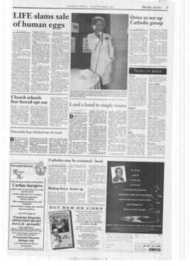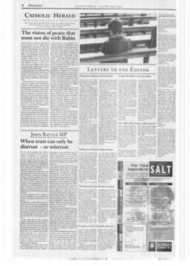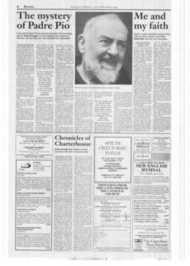Page 7, 10th November 1995
Page 7

Report an error
Noticed an error on this page?If you've noticed an error in this article please click here to report it.
Tags
Share
Related articles
Catholic Tv In The U.s.a.
T.v., Films By Freda Bruce Lockhart
Radio And Tv
Tv Needs Extra Vigilance To Guard The Family
Looking And Listening
But is this really a story of true love?
Inner Life
BY DAVID TORKINGTON It is a truth universally acknowledged that a television producer in possession of a brilliant classical adaptation can captivate a whole nation for six successive Sunday evenings without fail. Pride and Prejudice stormed to the top of the Radio Times chart, whose readers have placed it above Coronation Street and EastEnders, not to mention Keeping Up Appearances.
But after all, if you want to see people "keeping up appearances", what better than a Jane Austen adaption at its best, and all as the context for an engrossing romantic thriller where the barriers of pride and prejudice are. finally levelled by a love that softened the arrogant Mr Darcy. Who would ever have though that the great Sir Lawrence Olivier could have been equalled by Colin Firth, smouldering with repressed passions and unfulfilled desires until they were quelled by a love that he thought had been denied him forever.
The story could have come straight out 'of a Mills and Boon, but it's the way you tell them, as the old joke would have it. And Jane Austen tells them with consummate subtlety and sensitivity, with a humour and irony that was totally lost on me when I had to plough through her book for my exams. The love was far too implicit for me then, but I've learnt since that even the deepest feelings become the more apparent when their bearer struggles to contain them.
Inevitably even this "definitive dramatisation" has had its critics, from the purists who like Disraeli, have read it a dozen or more times, to the "professionals" who shake their heads over a miscasting here or a little too much melodrama there. Personally, I fmd that once an overall production is good enough to absorb me, I lose my critical powers and I'm delighted to do so, delighted to allow the action to take me out of myself for fifty minutes or more.
I remember going away on a retreat when I was at school that was lead by a monk, who asked each of us to describe the happiest moments in our lives. For some it was watching a particularly thrilling film, or an absorbing theatrical performance. For others it was listening to their favourite music, watching the match on Saturday afternoon, or playing in one themselves. For one or two boys who had the courage to admit it, it was walking their girlfriends home, hand in hand, or that wonderful good night kiss in those distant days of innocence.
All admitted that in those precious moments, time seemed to go into overdrive and they seemed to lose all self-consciousness. Happiness, said the monk is always a by-product, the result of a profound self-forgetfulness as we go out of ourselves into something or someone else. Love, he told us, is the most powerful force on earth, or in heaven for that matter, that can lift a person out of themselves, and lead them off into the happiness which we all desire more than anything else.
I think that's why Pride and Prejudice has had such an impact. It's not just the quality of the production that takes us out of' ourselves, it's the power of the love that we see at work, binding two vital and vibrant young people together.
And who doesn't yearn for the fruits of that love, that can destroy the barriers of pride and prejudice that enthrals the best of us? Who cares that Jennifer Ehle's more the stuff that dreams are made of than the original Elizabeth Bennett. I like dreams!
But when all the dreaming is done, what happens in any Jane Austin novel when the smouldering flames, and then smoulders itself out? It's a question that's never seriously addressed. What happens between the paradise found by so many other heroes and heroines at the beginning of their lives and paradise that seems to have been lost by the older generation at the end of their's? The journey that begins and feeds off first love and leads through sacrifice to the love that reaches out to eternity, is not the stuff that popular novels are made of. It's not the stuff that would make compulsive viewing either, but it is the stuff, the only stuff that can forge our deepest desires into the reality that has no end this side of eternity.
For it is a truth universally acknowledged that a television producer possessing a dramatic adoption of daily selflessness and sacrifice will never top the television charts and will never captivate whole nation for six successive Sunday evenings without fail. t
blog comments powered by Disqus











